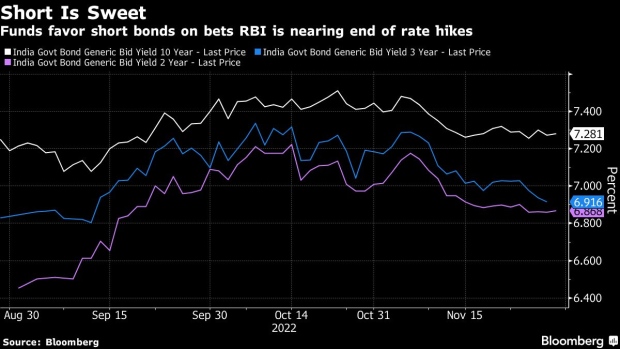Nov 30, 2022
RBI Is Seen Nearing Rate-Hike Peak With Funds Buying Short Bonds
, Bloomberg News

(Bloomberg) -- India’s shorter-maturity bonds are finding favor with fund managers as bets grow that the central bank may be nearing the peak of its rate-hike cycle.
Investors such as Quantum Asset Management Co. and Tata Asset Management Private are piling into debt with maturities of up to five years. They find longer-dated securities less appealing on concern that the government may keep borrowings near a record high next year to finance its spending ahead of the 2024 election.
The Reserve Bank of India is likely to complete its rate-hike cycle this financial year, or by February and expectations for easing will emerge if inflation comes within 5%, said Murthy Nagarajan, the head of fixed income at Tata Asset Management.
The “short end will benefit more because these entire rate-cut expectations will start building up from next year onward,” said Nagarajan. “Fall in yields may come next year only but you have to build a position right now.”
Like their global peers, Indian sovereign bonds rallied in November as falling oil prices temper inflation and expectations grow over less aggressive rate hikes from the Federal Reserve. Market players are betting the RBI will also opt for smaller increases after its most hawkish rate-setter called for a pause in October, saying borrowing costs have risen enough.
“We’ve already seen the peak hawkishness in the US, the global market and in India market as well,” said Pankaj Pathak, fixed-income manager at Quantum Asset Management in Mumbai. “Incrementally we’ll see a softer tone from here,” he said, adding that he bought three-to-five year bonds also due to attractive valuations.
India’s two-year yields have declined almost 40 basis points to 6.86% after reaching the year’s high in October. The rate on 10-year notes has dropped over 25 basis points from last month’s peak to 7.29%.
“For me, the fiscal risk is still an important issue,” said Devang Shah, co-head for fixed income at Axis Asset Management Co. “I believe that next year, being an election year, it may be difficult for the government to pull out the fiscal plug and go for massive contraction.”
(Updates prices in the seventh paragraph)
©2022 Bloomberg L.P.






